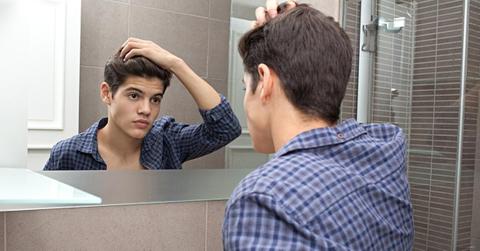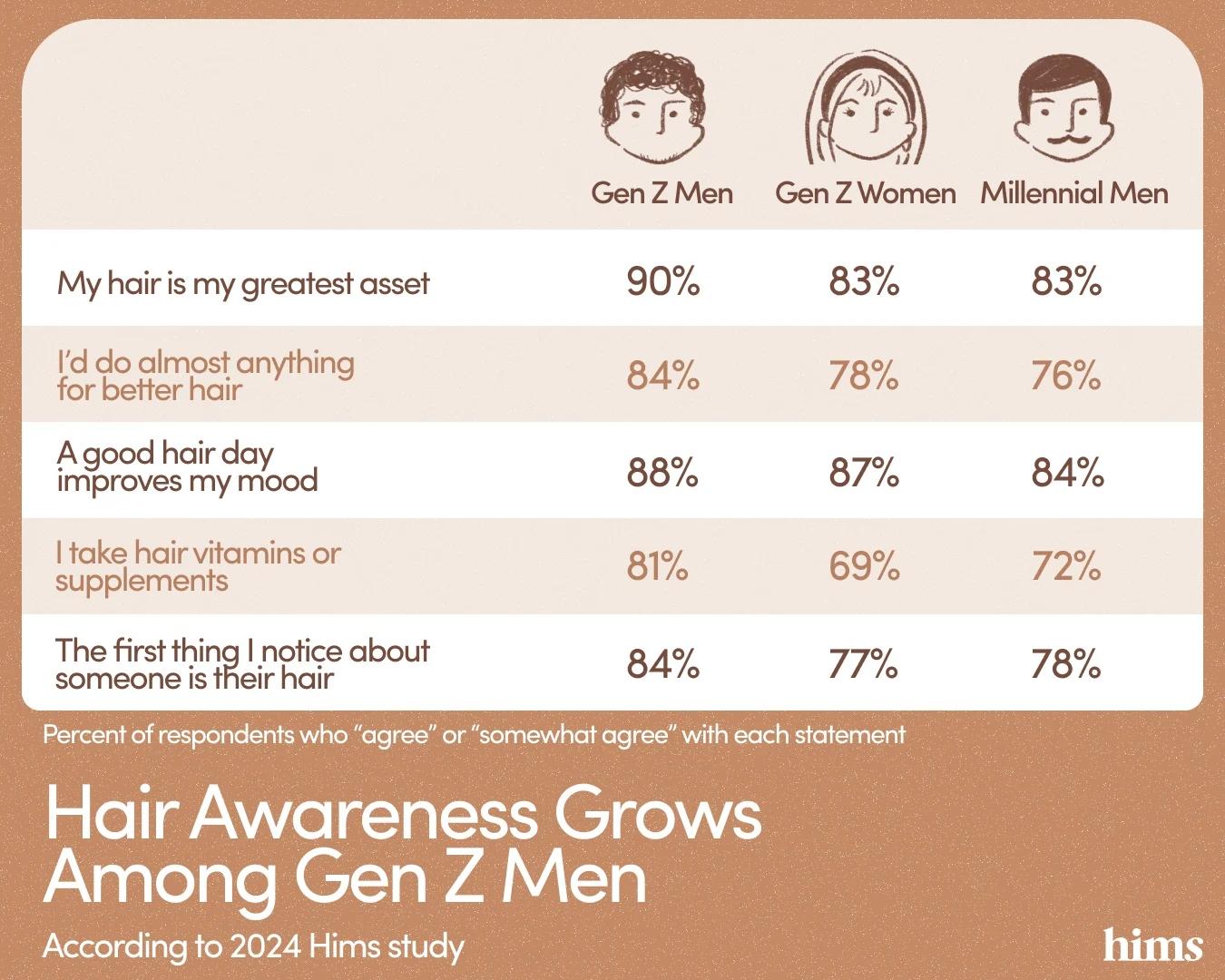
Gen Z Men Are the Biggest Beauty Market No One’s Talking About
Here's how Gen Z men are emerging as a powerful force in the beauty industry, driving trends and shaping the industry like never before.
By Melissa Lavigne-DelvilleSept. 25 2024, Updated 10:16 p.m. ET
There is no shortage of stories about young girls obsessing over skincare and stocking up on anti-aging serums. But Gen Z men may just be the most underrepresented demographic in the beauty business, particularly when it comes to hair care.
Fully 84% of surveyed Gen Z men say they'd do almost anything to have better hair, compared to 78% of surveyed Gen Z women who feel the same, according to a 2024 study conducted by Hims. Gen Z men are also more in love with their locks than their older counterparts: 90% say their hair is one of their greatest assets compared to 83% of Millennial men and 63% of Gen X men.
Hair Awareness Across Generation

Gen Z Men are Body-Conscious
Beyond hair, Gen Z men are also more body-conscious than their Gen Z female counterparts. On average, Gen Z men are spending twice as much on weight loss annually than Gen Z women ($714 vs. $360), and they are 1.5 times more likely than Gen Z women to follow a vegetarian or vegan diet (15% vs. 10%). Furthermore, 30% of Gen Z men say their weight is "extremely impactful" on how they feel about themselves vs. 25% of Gen Z women.
However, just because Gen Z men are body-conscious, it doesn't mean they are insecure about their appearance. Nearly eight in ten Gen Z men, 79%, consider themselves to be "attractive" (a 4 or 5 on a 5-point scale) as compared to 67% of Gen Z women who feel the same.
7 Ways Hair Matters For Gen Z Men
Gen Z men are two times more stressed about their hair than the upcoming presidential election.
When asked what stresses them out most, surveyed Gen Z men were twice as likely to say "My hair" (15%) than "The upcoming presidential election" (7.5%). They are also more stressed out about their hair than their ex (12%), climate change (12%), and even "the unknown" (12%).
They spend more on hair care than Millennial men or Gen Z women.
Gen Z men shell out an average of $593 on hair care annually, 34% more than Gen Z women, who report spending $425 annually. What are they spending on? Some 39% take vitamins or supplements specifically to improve their hair (vs. 30% of total respondents); and 38% have tried a hair growth product (vs. 31% of total respondents).
Gen Z men say a great hair day is better than going viral.
When asked to create their perfect day, "A great hair day" was 50% more likely than "going viral" to make young men's mornings (14% vs. 9%). It also ranked as a better way to start the day than having an inspiring idea (13.5%), dropping a few pounds (13%), an unexpected day off (10%), or good news in their news feeds (9%).
They spend (far) more time fussing with their hair than women.
Gen Z men spend 35% more time on their hair each day than do women overall. On average, Gen Z men report spending 44.26 minutes on their hair as compared to 32.68 minutes among women. One third of men say they spend 30 minutes to one hour a day on their hair, and an impressive 15% spend more than an hour a day taking care of and styling their locks.
Gen Z men are more likely than women to choose great hair over good food.
A significant 38% of Gen Z men say they would prefer to have good hair to good food, compared to 31% of Gen Z women and 28% of total respondents who feel the same. While it's true Gen Z men do still opt for good food over good hair overall (62%), they were the demographic most likely to care more about what their hair looks like than what they eat. Only 30% of Millennial men and 21% of Gen X men prioritize good hair over good food.
Hair is powerful in forming their first impressions.
More so than any other generation or gender, Gen Z men say hair is what forms their first impressions of others. A robust 84% agree, "The first thing that I tend to notice about someone else is their hair." This compares to 74% of Americans overall who feel the same. They are attracted to others with mid-length styles (37%) to long (35%) or short (29%) hair styles. They also prefer a clean shaven face (57%) to a full beard (43%).
Good hair days may even improve Gen Z men's job performance.
Good locks lift young men's moods. Fully 65% of Gen Z men say their hair is "extremely impactful" or "impactful" on their day overall, compared to 54% of Americans overall. Furthemore, 93% of Gen Z men vs. 85% of respondents overall say good hair is beneficial in their life in at least one way—21% say it improves their mental health; 18% say it inspires them to exercise more; and 16% say it improves their job performance.
Data & Methodology
This study is based on a 5,504-person online survey, which included 5,000 18-to-65-year-old respondents in the top 50 metropolitan areas (100 respondents per city) and a nationally representative sample of 504 18-to-65-year-old respondents to contextualize results. The study was fielded in May 2024.
Findings were analyzed by more than 100 demographic and psychographic cuts, including city, region, gender (when we refer to "women" and "men," we include all people who self-identify as such), age, race and ethnicity, relationship status, parenting status, sexual orientation (heterosexual, bisexual, gay, lesbian, pansexual, asexual, queer, etc.), and political affiliation, among other areas of interest.
All data in this study are from this source, unless otherwise noted. Independent research firm Culture Co-op conducted and analyzed research and findings.
3 Tips For Healthier Hair
- Eat a balanced diet. Adopt a hair-friendly lifestyle. Your diet plays a crucial role in the health of your hair. Consuming foods rich in essential vitamins and minerals, such as omega-3 fatty acids found in fish, vitamins A and E from leafy greens and nuts, and biotin from eggs and avocados, can help improve hair strength and may even promote growth. Eating a healthy, balanced diet may even help prevent hair loss.
- Incorporate regular scalp massages into your routine. Some research suggests that scalp massage may help stimulate hair growth. Scalp massages increase blood circulation to the hair follicles, which can promote regrowth and increase hair thickness. Use your fingers or a scalp massaging tool to gently massage your scalp for about five minutes each day.
- Opt for a silk or satin pillowcase. Unlike cotton, silk and satin create less friction, which can help reduce hair breakage and frizz while you sleep. Making this simple change can help improve the overall condition of your hair by minimizing wear and tear during the night.
This story was produced by Hims and reviewed and distributed by Stacker Media.

